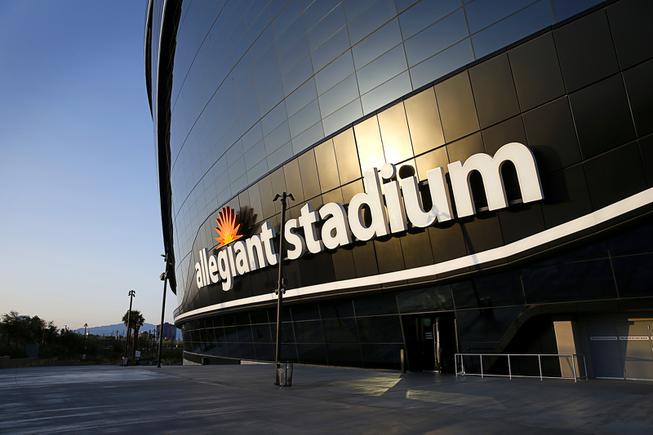Thursday, Nov. 30, 2023 | 2 a.m.
UNLV is tailoring its Sports Innovation Institute to the growing sports landscape in Las Vegas with hopes of preparing its graduates for a career in either sports sciences or the sports business.
The institute is designed to complement the region’s growing sports landscape, which has exploded in the past five years and includes the opening of the nearly $2 billion Allegiant Stadium to bring an NFL franchise to the region and attract the Super Bowl and Final Four.
Las Vegas also boasts recent championships from the Golden Knights in the National Hockey League and the Aces in the WNBA, approval from Major League Baseball to relocate the Oakland A’s, and legions of fans coming to town for the Las Vegas Grand Prix and National Finals Rodeo, among other events.
UNLV will bring the Sports Innovation Institute to the Nevada System of Higher Education Board of Regents for approval of institution status at the regents’ quarterly meeting today and Friday.
“As (UNLV) continues to be the intellectual hub of the sports capital, that’s important that our institution is in the middle of all those things,” said Jay Vickers, chief operating officer of the institute.
Through the institute, UNLV wants “to ensure that our students have great opportunities from a workforce standpoint, and we’re continuing to advance research and innovation in the sports space, and providing opportunities to these organizations that are moving here,” Vickers said,
The institute aims to be a “nationally recognized hub that integrates sport science and sport business to provide cutting-edge solutions to unique challenges and drive the future of sport,” according to its website. It has allocated space in the Bennett Professional Development building under the College of Education.
It offers master’s programs in sports management, internships such as working with the Super Bowl host committee, and a catalyst grant program for areas of sports research and innovation.
The proposal already had a starting point through Nancy Lough, who leads the master’s program in intercollegiate and professional sports management, Vickers said. The next steps were figuring out how to connect athletes and sports business majors with other areas like media and technology, he said.
Through funding from the Governor’s Office of Economic Development, Vickers and his team were able to build a website and start solidifying what they wanted the innovation institute proposal to look like.
The institute was aided with $3.25 million in federal funding, which helped it purchase a high-performance computer and enhance its research. The university credits Rep. Susie Lee, D-Nev., with helping secure the federal funding. In a statement, Lee said the funding would help “establish and ... secure UNLV’s standing as a leader in sports research and innovation,” adding that “UNLV will be able to leverage its research to help diversify our local economy, and it is clear that sports will be a vibrant part of our future.”
The institute isn’t just about the athletes, although that is one of the program’s pillars. There are 13 proposed pillars that include areas like esports, military and first responder health, sports betting, sports psychology and youth sports. The institute is studying everything from brain health to esports.
“We needed to get people and the folks involved with us to think outside the box of what is sports-related research and innovation, and what does that all encompass,” Vickers said.
The focus is three cornerstone programs: sports leadership, executive and advancement program (SLEAP); sports performance and entrepreneurship; and a sports data analytics hub.
Vickers said the institute gained support from both academic and professional circles. With the regents’ approval of institution status, more research support should flow.
UFC has allowed the institute to hold its Sports Research Summit at its Apex Center in southwest Las Vegas. The Raiders, Golden Knights and Aces have all made gifts to the program.
With the Las Vegas Super Bowl Host Committee and United Way of Southern Nevada, the university was able to create the first fully paid internship program in Super Bowl history, Vickers said. He wants to make the Sports Innovation Institute a research hub for all things sports, as well as a support system for these companies.
Getting this multidisciplinary program off the ground and into a physical space may take some time, but Vickers and his team are confident they’ll be able to bring this new opportunity for research to their sports-minded students and faculty.
“I think we’re a necessity for our growth,” Vickers said of the institute and its place in the sports economy. “Whether it’s a company that provides solutions to the Raiders, or Allegiant Stadium or the Aces or VGK or whoever, they need to understand that there’s a support system here in Las Vegas through higher ed, which is UNLV.”

